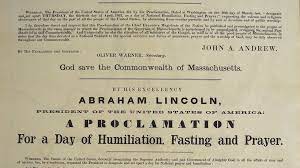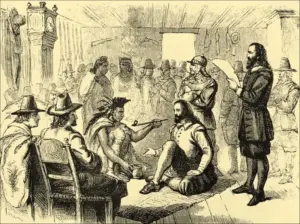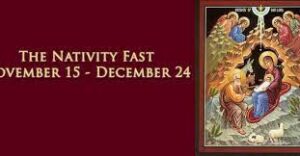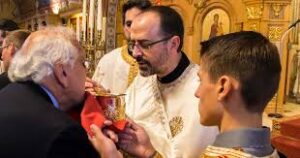This will be a short Post. Our family gathered in for Thanksgiving, and I’ve not had much time to write. Likely most of you also have had many things to do, so if you are not reading this Post I forgive you, though you’ll never know it. *
- God does that for us all the time.
Feasts? Fasts?
Our Orthodox days of celebration are titled “Feasts”, which means we should eat well. How odd. These days most people call such days just holidays. (Don’t tell the secularists that the word means “holy days”. It will drive them crazy.)
Likewise, our days of penitence we call “Fasts”, which means we should eat less. That doesn’t have any secular equivalent, since American today we don’t have days of penitence – even though there’s a great deal we might be penitent about. Abraham Lincoln appointed “the day of April 30, 1863, as a day of national humiliation, fasting and prayer”.

President Eisenhower appointed July 4, 1953 “as a National Day of Penance and Prayer”, but he said nothing about fasting.”
I have discovered that there is a “National Day of Prayer” (I’d never heard of it – have you?) designated by the US Congress in 1953 to be held on the first Thursday of May, when people are asked “to turn to God in prayer and meditation”, but no mention is made of fasting.
Modern America understands feasting * but, at least officially, has no grasp of penitence or fasting.
- Compared to 10% of the people in the world (and the percentage is increasing again) most of us feast every day.
An unnecessary but interesting Interruption regarding American Thanksgiving Day
According to Wikipedia, “Thanksgiving is a national holiday celebrated on various dates in the United States, Canada, Grenada, Saint Lucia, Liberia, and unofficially in countries like Brazil and the Philippines. It is also observed in the Dutch town of Leiden and the Australian territory of Norfolk Island.” (Who knew? Not I.)

Its American roots are in the harvest festivals of Western Europe. The Pilgrim immigrants to North America felt the need for such a festival, because scarcely half the original settlers had survived the first year. * “According to a contemporary account of that event by colonist Edward Winslow, the settlers and Native Americans dined on venison, fish and shellfish as well as corn and other vegetables.” (history.com) Sorry, no turkey.
- Without the help of the Native American “Indians”, very few of them would have survived. However, as the settlers moved ever further into Indian territory, within a generation they were at war.
Turkey didn’t become the usual dish for Thanksgiving till the early Eighteenth Century. President Franklin Roosevelt fixed the date as the last Thursday of November. President Harry Truman moved it a week earlier, at the behest of the commercial interests in order to provide more time for “Christmas shopping” (It figures.)
Already this Post is becoming longer that I had intended. Let’s move along.
Orthodox Feasts and Fasts
The Orthodox Christian Liturgical Year consists of alternate periods of Feasting and Fasting, with a large minority of ordinary days thrown in between. Did you know: If we behave ourselves, we Orthodox fast on more than half the days in the year – the forty day Advent Fast, the fifty day Great Lenten/Holy Week Fast preceded by the week immediately before, the Apostles’ Fast in June, Dormition Fast in August, and every Wednesday and Friday of the year (except during the Pascha celebration). We feast on Sundays (for the Resurrection), during the Twelve Days of Christmas and the Forty (or some say Fifty) days of Pascha. All the rest are “normal” days. And so on and on it goes year after year, decade after decade, century after century. Unlike in some places where eating meat on Friday was a mortal sin one week and no big problem the next week, these rules * do not change.
- If any here present are new to Orthodoxy, please understand: Our Orthodox rules are not laws; they are rules, guidelines. They are “maximalistic”, suggesting what a person should aim for. Neophytes should work into them very gradually. The most strenuous of them are kept only by the strict monasteries and a few particularly devout people out here in “the world”. Traditional Western Christianity tends to have laws which are “minimalistic”, indicating the minimum which is “necessary for salvation”.
Why all this emphasis on food?
Because “the way to a man’s heart is through his stomach”.
Thia old saying about human romance applies even more to our “romance” with God. Take the word “man” as generic and the word “heart” in its Orthodox sense (the very depth of our being), and you’ll see.
 Brothers and sisters, for all our high-falutin’ spiritual pretensions you and I are still very much creatures of earth. We spend most of our time eating and drinking and doing and thinking about all sorts of things that are very much of this material world. That’s not evil; that’s the way God made us. Therefore God, through His Church, takes eating and drinking and uses them for higher purposes, as a means to touch us deep in the core of our being and draw us nearer to Himself.
Brothers and sisters, for all our high-falutin’ spiritual pretensions you and I are still very much creatures of earth. We spend most of our time eating and drinking and doing and thinking about all sorts of things that are very much of this material world. That’s not evil; that’s the way God made us. Therefore God, through His Church, takes eating and drinking and uses them for higher purposes, as a means to touch us deep in the core of our being and draw us nearer to Himself.
There are many other things we do with our bodies. So, for an example, why are we not told to dance on days of celebration and to refrain from dancing on penitential days? Why food in particular? Well, breathing we can’t escape unless we want to die. Most other things, like dancing or singing, are optional or we can’t control them. But food and drink we require regularly, usually three times a day not counting snacks, and these we can control. Therefore the Church (and Judaism long before us, as well as most other Faiths – you know about Ramadan) has made use of food and drink, not just for bodily nourishment but also for spiritual nourishment.
 Thus every time we remember to fast on a fasting day, we will be drawn to think of God and how He wants us to change our ways and do better. And every time we eat well on a feasting day, we will be reminded to be grateful to God for this great blessing. And on ordinary days it’s such a relief not to have to think about what to feast on or what not to eat, that perhaps we’ll be grateful to God for all the ordinary things of life which we take so for granted. Thus such an everyday earthly thing as putting food in our mouth and tasting it and chewing it and swallowing it and letting it settle our stomachs becomes a way to draw us nearer to God. Clever on His part, eh?
Thus every time we remember to fast on a fasting day, we will be drawn to think of God and how He wants us to change our ways and do better. And every time we eat well on a feasting day, we will be reminded to be grateful to God for this great blessing. And on ordinary days it’s such a relief not to have to think about what to feast on or what not to eat, that perhaps we’ll be grateful to God for all the ordinary things of life which we take so for granted. Thus such an everyday earthly thing as putting food in our mouth and tasting it and chewing it and swallowing it and letting it settle our stomachs becomes a way to draw us nearer to God. Clever on His part, eh?
I think it all goes back to the story of Adam and Eve. When we human beings were still like innocent children and God our Father wanted to train us in being good and faithful to Him, He didn’t do it in some “spiritual” way. Like a father or mother dealing with little children, He told us “Don’t eat this.” When Satan wanted to “get us”, he didn’t really reason with us. He said “Go ahead and eat it. You can get by with it”. Today, now that we human beings are a little older, albeit not much wiser, He still trains us with food.
So we Orthodox take what might be called a “gutsy” (get it?) approach to our Religion. We let our tongues and our teeth and our stomachs lead us to God.
Why do we fast?
This is very simple.
Because we need to shape up. We all know that. Each of us can be so much better than we are. So the Church provides us times to turn to God in humility and work on that, let Him work on us.
Also because the Fasting seasons allow us to appreciate the Feasts all the more. Nothing ever tastes better than the Paschal Meal at the end of the Grent Lenten Fast.
The Advent Fast
 Of course you know that we Orthodox are now well into the Advent Fast (or Christmas Fast or the Nativity Fast or the Pre- Christmas Fast or Christmas Lent, as it is variously called) in preparation for the great Feast of the Nativity of Our Lord, God and Savior Jesus Christ (or Christmas, as it is usually called). If we check the instructions on our Orthodox calendars, we learn that the Advent Fast is kept just like Great Lent before Pascha: no meat, milk or milk byproducts, no eggs, no wine, no olive oil.
Of course you know that we Orthodox are now well into the Advent Fast (or Christmas Fast or the Nativity Fast or the Pre- Christmas Fast or Christmas Lent, as it is variously called) in preparation for the great Feast of the Nativity of Our Lord, God and Savior Jesus Christ (or Christmas, as it is usually called). If we check the instructions on our Orthodox calendars, we learn that the Advent Fast is kept just like Great Lent before Pascha: no meat, milk or milk byproducts, no eggs, no wine, no olive oil.
Really?
I wonder how many Orthodox keep it like that. I wonder how many of you, dear readers, keep it like that. I’d guess very few. And that’s alright. Orthodox rules can be adapted to circumstances. We wouldn’t expect a starving man to reject meat during Lent.
The general Orthodox tradition for those of us out here in “the world” is that the Advent Fast is kept with less severity than the Great Lenten Fast. In our household, partly due to our old age, we give up meat and that’s about it.
The Orthodox Advent Fast is very difficult to keep in modern America, where Advent is the time when Christmas is celebrated, and then during the last Eleven Days of Christmas nothing is celebrated except for the Bowl Games. * However, try to give up something during Advent. Meat, at least, if you can manage it. If not meat, then something else. And if you’re in a situation – a “pre-Christmas” Christmas dinner or party, for example – where good manners require you to break the Fast, then eat what you’re given gratefully, and afterwards go back to the Fast.
- See my Post: “The War on Advent”. https://frbillsorthodoxblog.com/2017/11/24/40-war-advent/
What about American Thanksgiving Day? Orthodox Bishops can’t give “dispensations”, because we have no laws to be dispensed from. However, our former Antiochian Metropolitan Philip (of greatly blessed memory +) advised: Eat the turkey! *
- Our Orthodox Fasting Spies take Thanksgiving Day off and do not peek into our windows to see whether we’re fasting. I believe they’re home eating turkey.
In case eating meat on Thanksgiving Day troubles you (but I’ll bet it doesn’t), next year relax and enjoy the feast!
I keep wandering. Sorry.
Why do we feast?
 That is even more simple, because most of us love to eat well.
That is even more simple, because most of us love to eat well.
Therefore God makes our salvation easy for us by giving us many Great Saving Events for us to celebrate, to eat and drink and (in better cultures than our own) dance. We Orthodox Christians also have Saints’ days, Name Days and more. I feel sorry for our deprived American secular culture which provides only the “Winter Holidays”: Thanksgiving, Christmas (sort of) and Bowl Games; Easter (sort of) and the Fourth of July. (Do Memorial Day and Labor Day count?). And no Fasts. In a word: b l a n d.
Go out of your way to eat well on Feast Days – not just at Pascha and Christmas, but on Ascension Day and on Pentecost and on August 15, the end of Dormition Fast and the Feast of the Falling Asleep of Our Lady, and on June 29, the end of Apostles Fast and the Feast of Saints Peter and Paul, and all the rest. Celebrate!

And above all (but briefly – this would require another Post or five): the greatest (though smallest) feast of all – the Holy Eucharist. God saves us through Food and Drink which are like no other. In Eden we broke God’s commandment and ate what was forbidden. Now every Sunday and every other Feast Day, we keep His commandment: “Do this for the re-calling of Me”. We celebrate the Holy Eucharist, and through a little Bread and a little Wine we eat and drink Salvation, Christ Himself, into our bodies and souls.
“Oh, taste and see that the Lord is good.” Psalm 34:8
“A life without festivals is like a long road without inns.” Democritus of Abdera * quoted in John Sadinopoulos’ excellent Blog: johnsadinopoulos.com
- Greek philosopher, Fifth Century BC, in case you’re curious. The pagan Greeks knew better than most of us do.
_______________________________
There! Just as I promised, a Post which is shorter than usual – by about two words. (Bloggers’ Disease: Once we get started, we can’t stop.)
Next Week: Prophets – what they weren’t and what they were
Week after Next: Saint Ambrose of Milan, one of the great saints almost unknown among Orthodox Christians
Father! I love your content and your style!
I’m glad this wasn’t a short post! And I’m glad you didn’t edit out your first sentence!!
Keep up the good work!
Thank you, David. I think sometimes I get a trifle too silly, so I’m glad you appreciate it. We need to be careful of humor. Sometimes silly humor can get in the way of the message. Under no circumstances should we make fun of other people. Also humor of the sarcastic kind is easily misunderstood. In a homily long ago I sarcastically compared a well-known “mealy-mouth” to Jesus “who also died at home in his bed”. Later a man asked me, quite seriously, “Did Jesus really die at home in his bed?” (!)